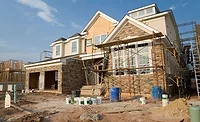Housing Production Shows Solid Start to 2020
Regionally in January 2020, combined single- and multi-family housing production increased 31.9% in the Northeast and 1.2% in the West.
Total housing starts decreased 3.6% in January from an upwardly revised December reading to a seasonally adjusted annual rate of 1.57 million units, according to a report from the U.S. Housing and Urban Development and Commerce Department. Meanwhile, overall permits surged to a 13-year high.
The January reading of 1.57 million starts is the number of housing units builders would begin if they kept this pace for the next 12 months. Within this overall number, single-family starts decreased 5.9% to a 1.01 million seasonally adjusted annual rate. The multi-family sector, which includes apartment buildings and condos, increased 0.7% to a 557,000 pace.
“The housing recovery continues, as single-family housing starts have surpassed 1 million for the second consecutive month and multifamily production has been running above 500,000 for the same period,” said Dean Mon, chairman of the National Association of Home Builders (NAHB) and a home builder and developer from Shrewsbury, N.J. “Meanwhile, builder confidence remains solid as demand continues to pick up.”
“While the solid pace for residential construction continues, favorable weather conditions may have accelerated production in the winter months,” said Danushka Nanayakkara-Skillington, NAHB’s assistant vice president of Forecasting and Analysis. “At the same time, the growth in permits is a harbinger that the market will continue to move forward in the coming months even as builders grapple with supply-side issues like excessive regulations, labor shortages and rising material costs.”
Regionally in January 2020, combined single- and multi-family housing production increased 31.9% in the Northeast and 1.2% in the West. Starts fell 25.9% in the Midwest and 5.4% in the South.
Overall permits increased 9.2% to a 1.55 million unit annualized rate in January. This is the highest level since March 2007. Single-family permits increased 6.4% to a 987,000 rate, while multi-family permits increased 14.6% to a 564,000 pace. Looking at regional permit data, permits are 34.6% higher in the Northeast, 8.2% higher in the Midwest, 8% higher in the South, and 3.1% higher in the West.
For more information, visit www.nahb.org.
Looking for a reprint of this article?
From high-res PDFs to custom plaques, order your copy today!




